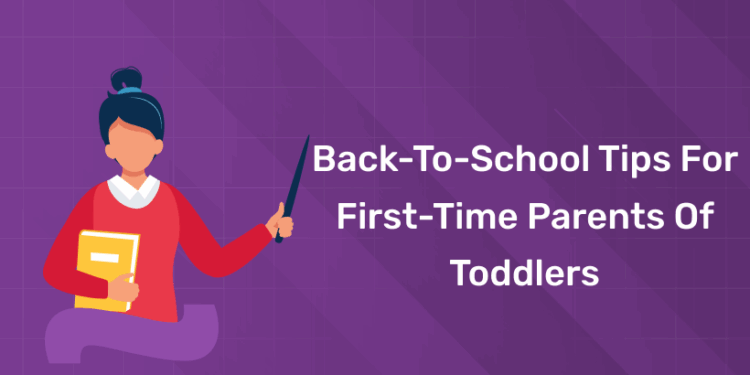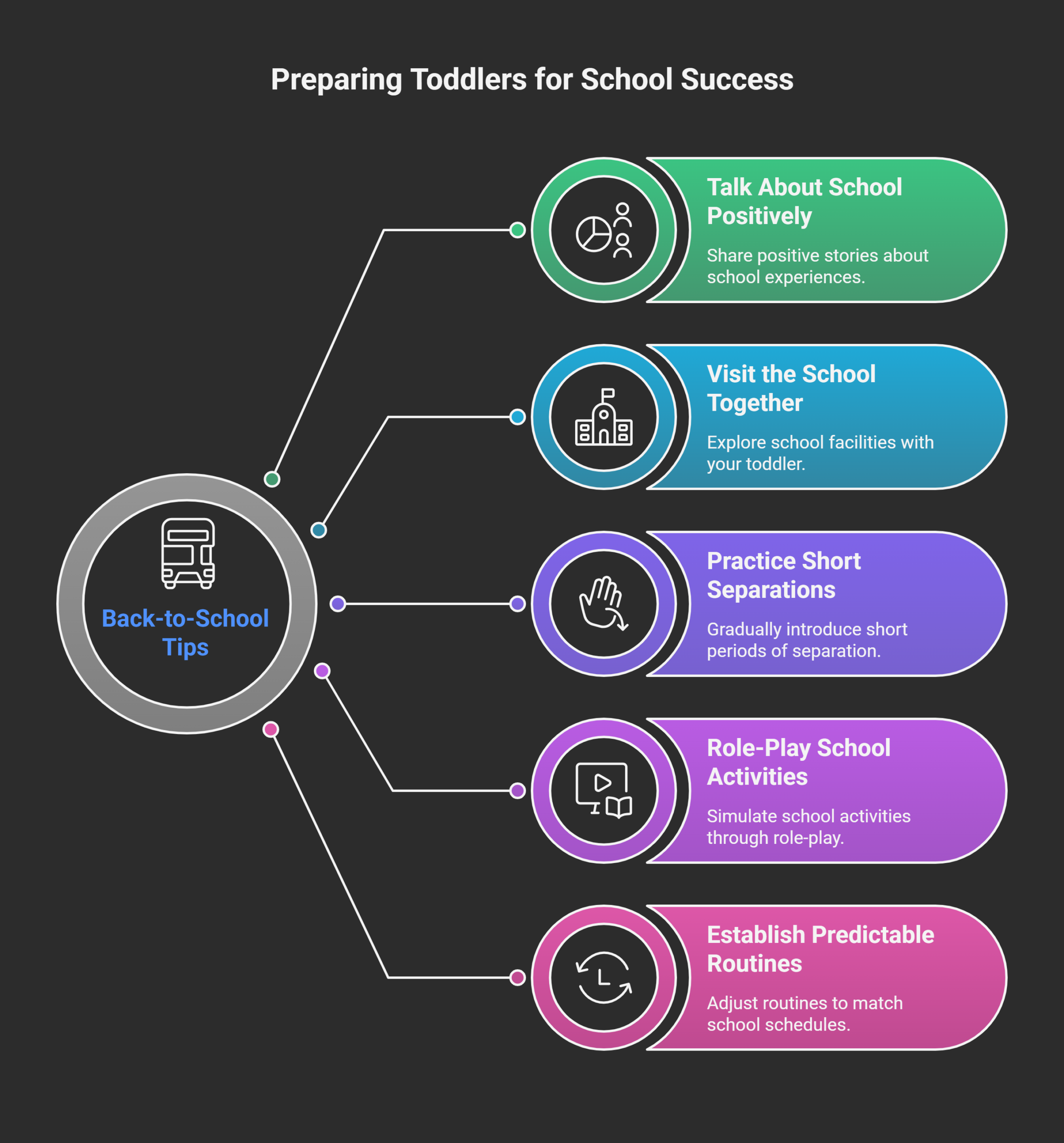Table of Contents
Back-to-School Tips for First-Time Parents of Toddlers help a lot. Parents feel happy and anxious at the same time. Toddlers face new teachers, friends, and routines for the first time. This step is big for both child and parent. A little planning makes things less stressful and smoother. Simple habits can prepare toddlers for school gently. With love and patience, the first day feels happy.
School is the start of new learning and growth. Toddlers learn to share, play, and talk with friends. Parents guide them with small, positive daily routines. Each kid learns at her/his own pace and style. Supporting them build trust and confidence. Preparation at home makes school feel safe and fun. These steps create a happy and smooth first school start.
Key Takeaways
-
Begin routines early and keep them simple.
-
Talk about school in a fun way.
-
Practice short separations before school.
-
Visit the school with your toddler.
-
Pack only what’s truly needed.
-
Avoid comparing with other children.
-
Stay calm during morning drop-offs.
Start your journey to becoming a certified Montessori teacher! Get free Demo Here!
Introduction
A Big Step for Parents and Toddlers
Starting school is a big step for everyone in the house hold. Guardians feel both excitement and nervousness at the same time. Kids experience new people, routines, and spaces. This creates both opportunities and challenges for them. A good start makes the journey smoother and joyful for the little ones. With the right steps, parents can ease this big change.
Why Preparation is Important
Toddlers need gentle support to adjust to school life. Preparation builds confidence and reduces stress for both child and parent. Small daily routines make children feel ready and secure. Parents play the most important role during this transition. Preparing well helps toddlers feel safe in a new place. The effort today shapes a child’s future love for learning.
Common Concerns Parents Face
-
Separation Anxiety:
-
Many toddlers cry during morning drop-offs.
-
-
New Routines:
-
There may be changes in sleep and meal timings.
-
-
Social Skills:
-
Sharing and playing with friends may feel difficult.
-
-
Emotional Readiness:
-
Some toddlers take more time to adjust.
-
How Parents Can Support
-
Talk About School Positively
Share simple stories about fun school activities. -
Practice Independence
Encourage small tasks like eating or packing a bag. -
Visit the School Early
Familiar places reduce fear and build comfort. -
Stay Patient and Calm
Children adapt faster when parents remain confident.
Building a Happy Start
A toddler’s first school day should feel safe and exciting. Parents can make this journey joyful with love and patience. With small efforts, school becomes a place of curiosity and fun. A gentle introduction creates lifelong learning interest and positive memories.
Why the First School Experience Matters for Toddlers
1: What is the primary focus of the first plane of development in the Montessori method?
A Foundation for Learning
The first school experience builds the base for future growth. Toddlers learn through play, stories, and guided group activities. Early schooling helps children see learning as enjoyable and exciting. A happy start builds curiosity and long-term interest in school.
Social Development
-
Learning to Share:
-
Toddlers share toys, snacks, and space.
-
-
Making Friends:
-
Children interact and build early friendships.
-
-
Understanding Rules:
-
They learn classroom rules and simple boundaries.
-
-
Respecting Others:
-
Toddlers learn patience, waiting, and turn-taking.
-
Emotional Growth
Early schooling builds confidence in toddlers’ daily lives. Children handle small separations from parents with teacher support. They gain independence by managing tasks on their own. This creates resilience and emotional strength for later stages.
Skill Development
-
Communication Skills:
-
Talking, listening, and expressing needs clearly.
-
-
Motor Skills:
-
Activities like drawing, climbing, and building blocks.
-
-
Cognitive Skills:
-
Sorting, counting, and problem-solving in fun ways.
-
-
Self-Help Skills:
-
Washing hands, eating snacks, and packing bags.
-
The Role of Routine
Routine gives toddlers a sense of order and safety. Regular activities help them know what to expect next. Predictable schedules reduce stress and build a sense of comfort.
Table: Benefits of First School Experience
| Area of Growth | How School Helps Toddlers |
|---|---|
| Social Skills |
|
| Emotional Skills |
|
| Cognitive Skills |
|
| Motor Skills |
|
| Life Skills |
|
Long-Term Benefits
Early positive school experiences shape future attitudes toward learning. Toddlers see school as safe, fun, and supportive. They carry this confidence into higher classes and new challenges. A strong start makes them eager, curious, and independent learners.
Get Certified & Start Your Montessori Career
Montessori Teacher Training Course by Entri App: Gain expert skills, earn certification, and kickstart your teaching career.
Join Now!When Should Toddlers Start School?
Understanding the Right Age
Most toddlers begin school between two and three years. The exact age depends on emotional and developmental readiness. Parents should look beyond age and focus on readiness signs. Each child grows differently, so timing is always personal.
Signs Your Toddler May Be Ready
-
Basic Communication:
-
Expresses needs using words or gestures.
-
-
Following Instructions:
-
Understands and follows simple teacher directions.
-
-
Social Interaction:
-
Shows interest in playing with other children.
-
-
Independence:
-
Manages small tasks like eating or washing hands.
-
Factors Parents Should Consider
-
Emotional Readiness
Some children separate easily, while others need time. -
Physical Development
Strong motor skills help them handle activities independently. -
Routine Adaptability
Ability to adjust to regular sleep, meal, and play times. -
Health and Immunity
A stronger immune system helps manage new environments better.
Role of Family Readiness
Parents should also feel comfortable with the school decision. Confidence and calmness reassure toddlers during the transition. A prepared family environment supports children’s adjustment to new routines.
Table: Age vs. Readiness Factors
| Age Range | Possible Readiness Signs |
|---|---|
| 2 – 2.5 years | Basic words, curiosity, plays alongside others |
| 2.5 – 3 years | Follows rules, shows independence, joins groups |
| 3 – 3.5 years | Communicates clearly, adapts faster, learns routines |
When to Wait a Little Longer
Some toddlers may not be ready at two years. Delaying school entry by months often improves adjustment. Waiting ensures children enjoy school instead of fearing it. Parents should follow the child’s pace, not strict timelines.
Start your journey to becoming a certified Montessori teacher! Get free Demo Here!
Preparing Your Toddler Emotionally for the First Day
Why Emotional Preparation Matters
Toddlers may feel scared when leaving home for school. Preparing them emotionally reduces stress and builds confidence in children. A well prepared toddler feels safer in a new environment. Parents play a big role in this process.
Steps Parents Can Take
-
Talk About School Positively
Share happy stories about teachers, play, and friends. -
Visit the School Together
Take them around classrooms, playgrounds, and activity areas. -
Practice Short Separations
Leave them alone with caregivers for short periods. -
Role-Play School Activities
Play snack time, story time and packing a bag. -
Establish Predictable Routines
Change sleep and meal schedules before school starts.
Helping with Separation Anxiety
Many toddlers cry at morning drop-offs during early weeks. Quick, calm goodbyes work better than long emotional ones. A simple goodbye routine makes children feel more secure. Teachers also provide comfort when children miss their parents.
Table: Simple Preparation Methods
| Preparation Step | How It Helps Toddlers |
|---|---|
| Talk positively | Builds excitement and reduces fear |
| Visit school | Familiarizes child with new space |
| Short separations | Reduces shock of being apart |
| Role-play routines | Makes activities feel familiar |
| Predictable schedules | Prepares body and mind for change |
Building Confidence at Home
Encourage them to dress or eat on their own. Praise them to raise their confidence. Children feel strong when their parents are patient and calm. Continuous encouragement helps toddlers adjust happily to school life.
Common Mistakes First-Time Parents Make
Why Mistakes Happen
First-time parents often worry about school readiness. This may lead to unhelpful choices for toddlers. Understanding mistakes helps parents support children in better ways.
Common Mistakes Explained
-
Overemphasizing Academics
Parents push early reading or writing too soon.
This creates stress and reduces play-based learning. -
Avoiding Gradual Separation
Parents stay too long during school drop-offs.
This increases dependency and makes separation harder later. -
Comparing Children with Others
Each child learns at a unique personal pace.
Comparisons lower confidence and create unnecessary pressure. -
Skipping Home Routines
Toddlers struggle without regular sleep and meal times.
Lack of structure makes school transitions more stressful. -
Ignoring Emotional Readiness
Some parents focus only on age, not feelings.
Emotional comfort is as important as physical readiness.
Table: Mistakes and Better Alternatives
| Common Mistake | Better Alternative |
|---|---|
| Overemphasizing academics | Encourage play and curiosity |
| Avoiding separation steps | Practice short, calm separations |
| Comparing with others | Focus on child’s individual progress |
| Skipping routines | Set consistent meal and sleep schedules |
| Ignoring emotions | Watch readiness signs, not just age |
How Parents Can Improve
Parents must stay calm and patient during this time. Encourage curiosity instead of rushing academic tasks. Create a strong, predictable daily routine at home. Support emotions with reassurance and small independence tasks.
Get Certified & Start Your Montessori Career
Montessori Teacher Training Course by Entri App: Gain expert skills, earn certification, and kickstart your teaching career.
Join Now!Conclusion
The first school day is a big change for toddlers. Parents guide them with love, patience, and steady routines. A gentle approach helps children feel safe and confident. Small steps like role-play and school visits make adjustment easier. Back-to-School Tips for First-Time Parents of Toddlers ensure smoother transitions. A positive start builds curiosity and trust in learning environments.
Every child adjusts differently and follows their own unique pace. Parents should avoid comparisons and focus on steady encouragement. Emotional readiness matters as much as physical development at this stage. Early positive experiences create lasting interest in school and learning. With calm support, toddlers grow independent and happy in school life.
Get Certified & Start Your Montessori Career
Montessori Teacher Training Course by Entri App: Gain expert skills, earn certification, and kickstart your teaching career.
Join Now!Frequently Asked Questions
How do I know my toddler is ready for school?
Readiness is not only about age but about development. A toddler ready for school can usually communicate needs using words or gestures. They show interest in playing with other children and can follow simple instructions. Emotional readiness also matters because children need to feel safe when separated from parents. If your child shows curiosity, independence, and some social comfort, they are likely ready for school.
What should I do if my toddler cries every morning?
Crying during early drop-offs is very common and normal. It shows your child needs extra reassurance and adjustment time. Parents should keep goodbyes short, calm, and consistent to avoid making it harder. Over time, toddlers learn that parents always return after school. Trusting teachers and maintaining routines at home help reduce morning tears.
How can I help my toddler adjust to school routines?
Start by introducing small routines before school begins, such as consistent wake-up and bedtime schedules. Practice activities like eating breakfast at a set time or packing a bag together. Establishing routines helps children know what to expect daily. Predictability reduces anxiety because toddlers thrive in structured environments. The more familiar these routines feel, the easier the transition will be at school.
What are some common mistakes parents should avoid?
One mistake is focusing too much on academics too early. Toddlers learn best through play, interaction, and exploration. Another mistake is staying too long at drop-off, which can make separation harder. Comparing your child with others can also harm their confidence. Avoid skipping routines at home because structure prepares children better for school life.
How important is play in a toddler’s first school year?
Play is the most important way toddlers learn in school. Through play, children practice sharing, problem-solving, and creative thinking. It also helps with communication and building friendships. Structured lessons are less important than playful activities at this stage. A school that encourages play-based learning gives toddlers the best start.
How can I reduce my own anxiety about sending my child?
Parents often feel more anxious than children at first. Talking with teachers about routines can help ease your worries. Visiting the school beforehand also creates familiarity for both parent and child. Focus on the benefits your toddler will gain, like independence and social skills. Remember that your calmness reassures your child and makes separation easier.
What should I pack in my toddler’s school bag?
Keep the school bag simple and light to avoid confusion. Pack a water bottle, snacks, a change of clothes, and wipes. A small comfort item, like a toy, may also help. Label everything clearly so items don’t get lost or mixed. Avoid overpacking, because too many items can overwhelm a toddler.
Should I expect academic learning during the first year?
The first year of school focuses mainly on social and emotional growth. Children may learn basics like colors, numbers, and songs, but not structured academics. Teachers emphasize play, group activities, and simple problem-solving instead of worksheets. These experiences build a love for learning without pressure. Academic concepts come naturally once children feel comfortable and curious.
How do teachers help toddlers with separation anxiety?
Teachers are trained to handle early separation challenges with care. They often distract children with toys, activities, or songs after drop-off. Teachers provide comfort, reassurance, and consistency to build trust. They also encourage group play to help children feel included quickly. With time and patience, most toddlers adjust within a few weeks.
How can parents support school learning at home?
Parents can support learning by reinforcing school routines at home. Read books together, encourage storytelling, and play simple educational games. Let toddlers practice independence with small tasks like dressing or tidying up. Talk positively about school experiences to build excitement. Staying involved without pressuring helps children grow confident and happy learners.













